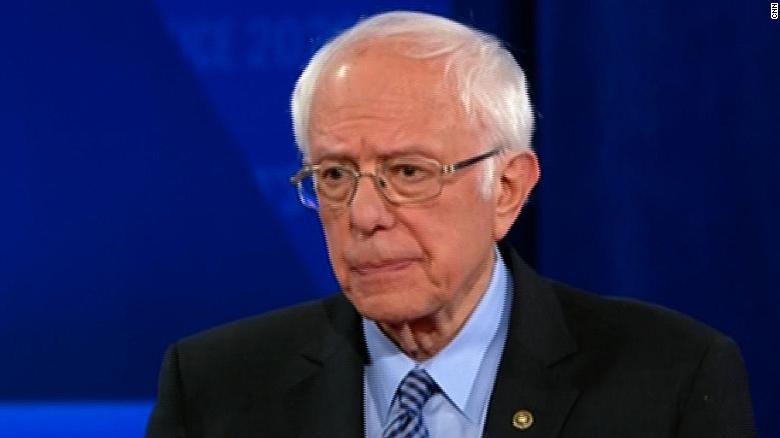Washington (CNN)Sen. Bernie Sanders offered a partial defense of Fidel Castro's Cuban revolution, asserting that "It's unfair to simply say everything is bad" with the way the late despot ruled the country.
"We're very opposed to the authoritarian nature of Cuba but you know, it's unfair to simply say everything is bad. You know?" Sanders said on CBS' "60 Minutes" in an interview that aired Sunday. "When Fidel Castro came into office, you know what he did? He had a massive literacy program. Is that a bad thing? Even though Fidel Castro did it?"
The comments -- which could prove to alienate some moderate Democrats as Sanders' chases the party's primary nomination -- came in response to a question about remarks Sanders had made in the 1980s assessing that the Cuban people didn't rise up against Castro because of education and healthcare.
When host Anderson Cooper pointed to the notable number of dissidents imprisoned in Cuba, Sanders responded, "That's right. And we condemn that."
"Unlike Donald Trump, let's be clear, you want to -- I do not think that Kim Jong Un is a good friend," he said. "I don't trade love letters with a murdering dictator. Vladimir Putin, not a great friend of mine."
Castro, who died in 2016, drew scores of admirers and detractors as he clung to a socialist economic model and one-party Communist rule, even after the Soviet Union disintegrated.
Sanders, a self-described Democratic socialist, has solidified his status as the front-runner vying for the Democratic presidential nomination after claiming victory in the Nevada caucuses on Saturday.
The senator's comments were criticized by some of his Democratic rivals on Monday.
"After four years of looking on in horror as Trump cozied up to dictators, we need a president who will be extremely clear in standing against regimes that violate human rights abroad. We can't risk nominating someone who doesn't recognize this," former South Bend, Indiana, Mayor Pete Buttigieg tweeted.
Former New York Mayor Michael Bloomberg also pushed back against Sanders on Twitter: "Fidel Castro left a dark legacy of forced labor camps, religious repression, widespread poverty, firing squads, and the murder of thousands of his own people. But sure, Bernie, let's talk about his literacy program."
And former Vice President Joe Biden's campaign said Sanders' comments "are a part of a larger pattern throughout his life to embrace autocratic leaders and governments across the globe."
"He seems to have found more inspiration in the Soviets, Sandinistas, Chavistas, and Castro than in America," Biden senior adviser Crist├│bal Alex said in a statement.
The coments also drew pushback online Sunday night, including from Democratic Rep. Donna Shalala of Florida who tweeted, "I'm hoping that in the future, Senator Sanders will take time to speak to some of my constituents before he decides to sing the praises of a murderous tyrant like Fidel Castro."
Rep. Debbie Mucarsel-Powell, D-Florida, tweeted Monday morning, "As the first South American immigrant member of Congress who proudly represents thousands of Cuban Americans, I find Senator Bernie Sanders' comments on Castro's Cuba absolutely unacceptable."
Florida Republican Sen. Marco Rubio also rebuked Sanders' remarks, stating, "he's wrong about why people didn't overthrow Castro. It's not because 'he educated their kids, gave them health care' it's because his opponents were jailed, murdered or exiled."
The senator has a lengthy history of laudatory comments about Castro and Cuba.
In 1985, Sanders, during a local television interview, said that while Castro was not "perfect," it was important for Americans to know that "just because Ronald Reagan dislikes these people, doesn't mean that people in their own nations feel the same way."
Buzzfeed reported during the 2016 election that Sanders said at the same time that America was "very, very mistaken about" the Cuban people's desire to revolt against Castro because Americans "forgot that he educated their kids, gave their kids health care, totally transformed the society."
Local outlets in Vermont also reported in 1989 how Sanders, then mayor of Burlington, Vermont, traveled to Cuba for an eight-day visit and met with the mayor of Havana. Upon returning, according to the Rutland Herald, Sanders lauded the impact the Castro revolution had on the country, calling them "more profound than I had understood it to be."
Sanders' previous comments about Castro came up during a Democratic primary debate in 2016. Sanders dodged the question of whether he regretted praising Castro, instead stating that while Cuba is an "authoritarian, undemocratic country ... it would be wrong not to state that in Cuba they have made some good advances in healthcare, they are sending doctors all over the world."
This story has been updated to include additional reaction and Sanders' previous comments.



















